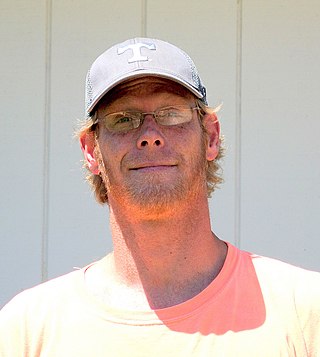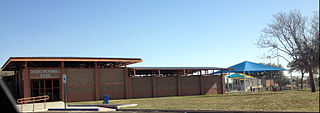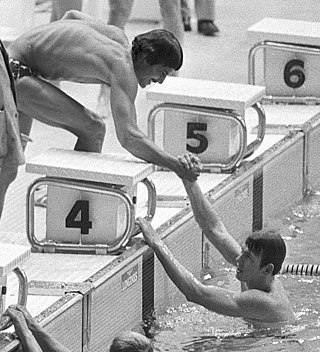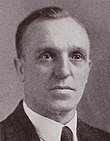
Richard Walter Quick was a Hall of Fame head coach for the women's swim teams at the University of Texas from 1982 through 1988 and at Stanford University, from 1988 through 2005. In an unprecedented achievement, Quick's Women's teams at Texas and Stanford won a combined 12 NCAA National championships, with his Men and Women's team at Auburn winning his final championship in 2009. His teams won a combined 22 Conference championships. He was a coach for the United States Olympic swimming team for six Olympics—1984, 1988, 1992, 1996, 2000 and 2004.

James Paul Montgomery is an American former competition swimmer, four-time Olympic medalist, and former world record-holder. Montgomery was the first man to break the 50-second barrier (49.99) in the 100-meter freestyle, at the 1976 Summer Olympics in Montreal, Quebec, where he won three gold medals and one bronze.

Jason Edward Lezak is an American former competitive swimmer and swimming executive. As a swimmer, Lezak specialized in the 50-meter and 100-meter freestyle races. His pro career lasted for nearly fifteen years, spanning four Olympic games and eight Olympic medals.

Sharon Marie Stouder, also known by her married name Sharon Stouder Clark, was an American competition swimmer, three-time Olympic champion, and former world record-holder in four events.

Jeremy Porter Linn is an American former competition swimmer, Olympic medalist, world record-holder and current swim coach. Linn set an American record in the 100-meter breaststroke while winning the silver medal in that event at the 1996 Summer Olympics in Atlanta, in a time of 1:00.77. With a burst of speed in the final stretch, he finished just .12 seconds behind the gold medal winner from Belgium who had previously set the World Record.

David "Dave" Charles Berkoff is an American former competition Hall of Fame swimmer, Olympic champion, and former world record-holder in two events. Berkoff was a backstroke specialist who won a total of four medals during his career at the Olympic Games in 1988 and 1992. He is best known for breaking the world record for the 100-meter backstroke three times, beginning at the 1988 Olympic trial preliminaries, becoming the first swimmer to go under 55 seconds for the event. He is also remembered for his powerful underwater backstroke start, the eponymous "Berkoff Blastoff" which after a strong push-off from the side of the pool used a horizontal body position with locked arms outstretched overhead and an undulating or wavelike aerodynamic dolphin kick to provide thrust and build speed.
Catherine Mai-Lan Fox, born December 15, 1977 in Detroit, Michigan, is an American former swimmer who competed for Stanford University, and won two gold medals swimming freestyle at the 1996 Summer Olympics, one in the 4x100 freestyle relay and one in the 4x100 medley relay.

Stephen Edward Clark is an American former competition swimmer for Yale University, Olympic champion, and former world record-holder.

Steven Charles Furniss is an American former swimmer, business owner, Olympic bronze medalist and world record-holder.

Susan Christina von Saltza, also known by her married name Christina Olmstead, is an American former competition swimmer, Olympic champion, and former world record-holder in four events.

Douglas Albert Russell is an American former competitive swimmer, Olympic champion, and former world record-holder in three different events.

Richard William Roth is an American former competition swimmer, Olympic champion, and former world record-holder in two events.

Jerome Alan Heidenreich was an American competition swimmer for Southern Methodist University, a 1972 Munich Olympic champion, and a former world record-holder. He set six world records during his swimming career, all as a relay team member.

Gregory Fenton Buckingham was an American competition swimmer, Olympic silver medalist, and former world record-holder in two events.

Richard Fitch Cleveland was a Hawaiian-born American competition Hall of Fame swimmer, three-time Pan American Games champion, and former world record-holder in the 100 meters and 100 yard events. He attended Ohio State University, and was one of the early competitive swimmers to benefit from the use of weight training in the off season. He later worked as a real estate broker

Burwell Otis Jones was a physician specializing in dermatology, and a former American competition swimmer. He was an All-American for the University of Michigan, and represented the U.S. in the 1952 Olympics, later receiving a gold medal when Olympic rules changed allowing him to receive his medal for winning the preliminary in the 4x200 freestyle relay, though not competing in the final heat that won the event. He was a 1951 Pan American Games gold and bronze medalist, and a recurring age group National champion in United States Masters Swimming into his later years.

Wallace "Wally" Perry Wolf Jr. was an American attorney, bank director, competition swimmer, water polo player, and Olympic champion. He competed in the 1948, 1952, 1956, and 1960 Summer Olympics.
Jack Babashoff Jr. is an American former competition swimmer and a 1976 Olympic silver medal winner in the 100 meter freestyle.

Paul Michael Hartloff is an American former competition swimmer who represented the United States at the 1976 Summer Olympics in Montreal, Quebec. Hartloff competed in the men's 1,500-meter freestyle event, but in a highly competitive year finished seventh in the final. After qualifying for the 1976 Olympics at the Olympic Trials in Long Beach, California, he set an Olympic record on July 19, 1976, in a qualifying heat for the 1,500-meter event at the 1976 Montreal Olympics in Montreal, Quebec, with a time of 15:20.74, but in a highly competitive year, his time was a full 14 seconds slower than American Olympic team mate Brian Goodell's recent standing world record of 15:06.66.

David "Dave" Charles Johnson is an American former competition swimmer and 1968 Mexico City Olympic competitor. He later graduated Yale Medical School and became an orthopaedic surgeon, specializing in sports medicine.





















